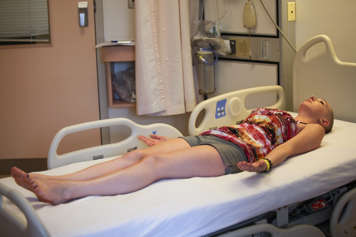Being a teenager is already stressful. You have your hands full dealing with increasing school and social pressures, hormones, body changes and volatile emotions. Coping with cancer and managing treatment on top of all these other stressors can be difficult for most teenagers. Cancer turns your world upside down and changes everything instantly. But yoga can help.
What is yoga and how can it help?
Yoga aims to restore the balance between one’s body, mind and spirit through a series of gentle exercises and breathing techniques. It’s great for stretching and can help you feel relaxed.
Yoga is good for teenagers since these can be difficult years, both emotionally and physically.
Benefits of yoga
- Improves fitness
- Boosts energy and well-being
- Improves your focus
- Helps you feel more confident
- Helps control stress and reduce anxiety
- Helps manage pain and nausea
- Promotes a feeling of calm and relaxation
Cancer and yoga
Yoga provides a good workout that you can adjust to your needs and energy levels, depending on how you feel and where you are in your treatment. Yoga can even be practiced in bed or in a chair. Always start a yoga routine under supervision from your doctor and ask about a good yoga teacher, especially one who has experience with illness. Remember too that yoga is not a competition. Always start slowly and never push yourself into pain.
Yoga breathing
Learning to breathe in certain ways is a really important part of yoga. It can also help you with any fatigue, pain, nausea and anxiety related to your cancer treatment.
To start, place a hand on your belly and inhale slowly and deeply through the nose, feeling your belly expand into your hand. Breathe out again and squeeze your belly back (imagine you’re trying to pull your belly button back to your spine), letting go of any tension.
As you do this, begin to connect to your breath and notice the air flowing in and out.
Strike a pose!
There are lots of poses you can do in yoga to help strengthen and stretch your muscles or even just to relax. Remember to wear loose comfortable clothes and try not to eat for at least two hours before you practice.
Whenever you’re doing your poses, try to keep a straight back to allow the energy to flow, and to avoid straining your muscles. If you are sitting on a chair, make sure both feet are touching the ground.
Mountain (tadasana)
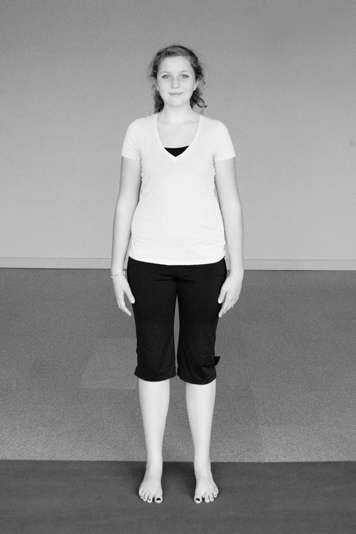
- Stand with feet hip-width apart with your weight evenly balanced on your feet. Keep your knees straight, but not locked.
- Pull up through the top of your forehead and try to make your spine feel longer.
- Tilt your tailbone (bottom of your spine) under so it points towards the ground and relax your shoulders away from the ears.
- Inhale (breathe in) and exhale (breathe out) smoothly.
- Mentally scan your body, releasing any tension. Pay attention to relaxing your neck, face, jaw, and tongue.
- It can also be a good idea to tell yourself an affirmation – a positive phrase that you use every day. Something like "I am strong and brave" might work well, or maybe you can think of another one that you like better.
Archer pose
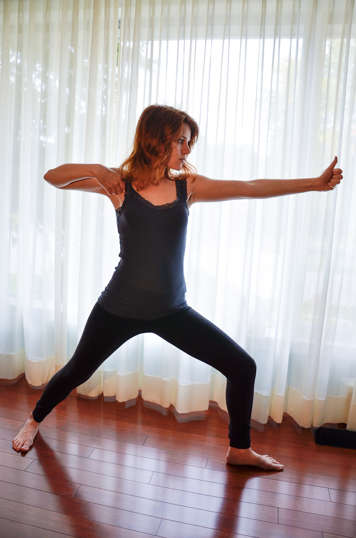
This pose generates fearlessness and is thought to help balance the nervous system.
- While standing, step forward with your left leg so your legs are about 2.5 feet apart.
- Turn your right foot out at a 45-degree angle.
- Raise your left arm straight out in front, parallel to the ground, with your hand in a fist as if grasping a bow.
- While holding out your left arm, pull your right arm back as if it’s pulling back on a bowstring. Have your right hand in a fist near your right shoulder.
- Both wrists form a straight line with your shoulders. Bend your left knee and squeeze your thighs together.
- Look at your left fist and feel like a strong warrior.
Hold for 1 or 2 minutes and then switch sides.
Tree pose
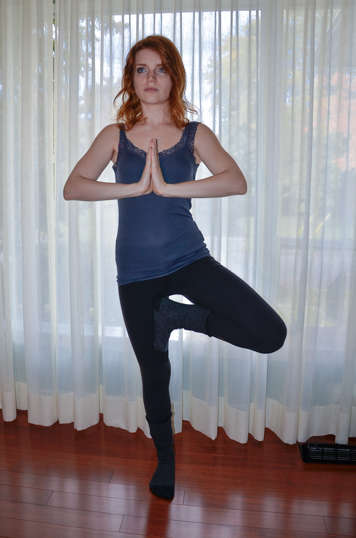
This posture is believed to improve balance and strength. It can also help improve concentration.
- Begin in mountain pose.
- Stand upright and then shift your weight so it’s on one foot.
- When you feel stable, place your other foot either at your ankle, calf or inner thigh. Do NOT place your foot on your knee. Focus on a spot in front of you to help you balance.
- Breathe deeply and, when you feel ready, raise your arms and put your hands together in front of your chest.
Hold for a few breaths and then switch legs.
Punching

This will help alleviate frustration and create new energy. It also helps release tension from your shoulders and chest.
- Create an "o" shape with your mouth.
- Make your hands into fists, tucking your thumbs inside.
- Sit or stand and powerfully punch straight in front of you extending the arms at shoulder level. Be careful not to strain your elbows or shoulders.
- Alternate (switch) your arms rapidly. Allow your body to twist with the motion.
Do this for 1-2 minutes.
Cat - Cow
This exercise is great for loosening up the spine and increasing flexibility, even if you are sitting up while you do it.
- Sit at the edge of your bed or chair, placing both feet on the floor and your hands on your knees. You can also hold your hands together with arms extended in front of your body.
- Inhale and arch your back, pushing your chest forward. Lift your face and point your chin to the ceiling. This is cow pose.
- As you exhale, pull in your tummy and pull your spine back. Bring your head down and look straight ahead. This is cat pose.
- Continue switching between cow and cat, making sure your elbows are straight and the movement is all from the spine.
Repeat 10-30 times depending on your comfort level and abilities.
When your energy is low, try some of the breathing exercises and the following poses.
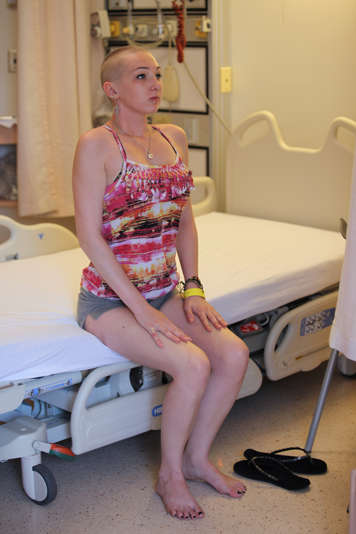
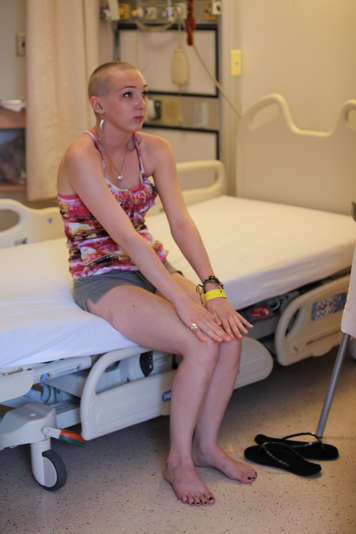
Yoga poses to do in bed
Stretch pose
This helps to set the navel (belly button). In yoga, the navel is the home of our personal power, so this posture is good for empowering yourself.
- Lie down and keep your legs together and arms by your side.
- Press your lower spine into the mattress.
- Lift up both feet 6 inches and raise your head, staring at your toes.
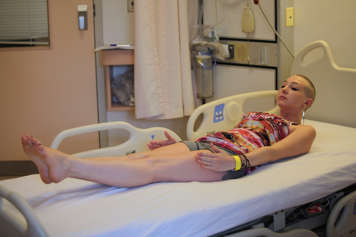
Try to build up to holding this pose for 1 minute.
Nose to knees
Believed to help with digestion and constipation.
- Hug both knees to your chest.
- Lift up your head and hold it for 1 minute, practicing your yoga breath.
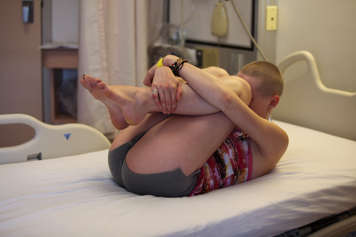
Ego eradicator
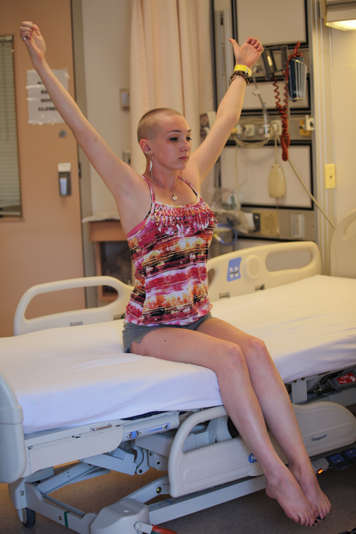
- Sitting up at the edge of the bed, raise your arms overhead in a V shape.
- Stretch your thumbs to the sky and curl your fingers onto the palms of your hand.
- Breathe in and out slowly. Hold for as long as you can, up to a minute.
Pick-me-up (bridge pose)
Believed to help boost energy and stimulate your kidneys.
- Lie down and bend the knees so that your heels are close to your buttocks.
- Inhale and press the soles of the feet into the mattress.
- Lift up your hips and exhale.
- Lower your hips as you inhale.
Repeat 10-15 times depending on your comfort level and abilities.
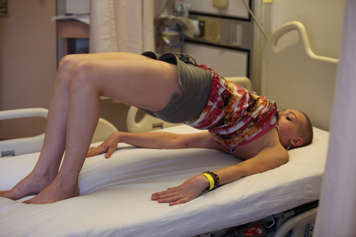
Life nerve stretch
This helps to stretch your sciatic (say: sy-AT-ik) nerve and the back of your legs and maintains flexibility.
- Sitting up, flex both feet back towards the head.
- Keeping a straight back, reach as far down your legs as you can – it might be your shins or your toes, or somewhere in between.
- Breathe long slow breaths.
Continue holding and breathing in this pose for 1 minute.
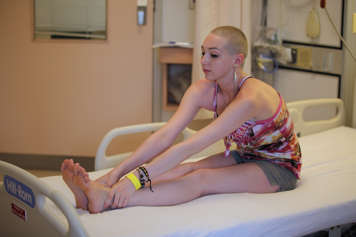
Relaxation
Relaxation is also called savasana (say: sa-VAS-a-na) or corpse pose. It is done at the end of yoga practice to help combine the wonderful benefits of the poses. It gives you time to let go and relax and helps the body, mind, and spirit rejuvenate and heal. You can choose some great music to help you relax.
- Lay on your back, with your arms away from your sides, palms up, and shoulders relaxed.
- Close your eyes.
- Relax your legs and allow the feet to fall open to the sides.
- Feel the tension releasing from your muscles and the whole body releasing down toward the floor.
- Let your breath be natural and easy and allow your thoughts to drop away. If you feel yourself thinking or moving, just let it go and return to your breath. Keep coming back to what is happening right now, in this moment.
- Imagine a pure white healing light surrounding your body, making you feel safe and at peace.
- Feel yourself sinking deeper and deeper into relaxation. Enjoy!
